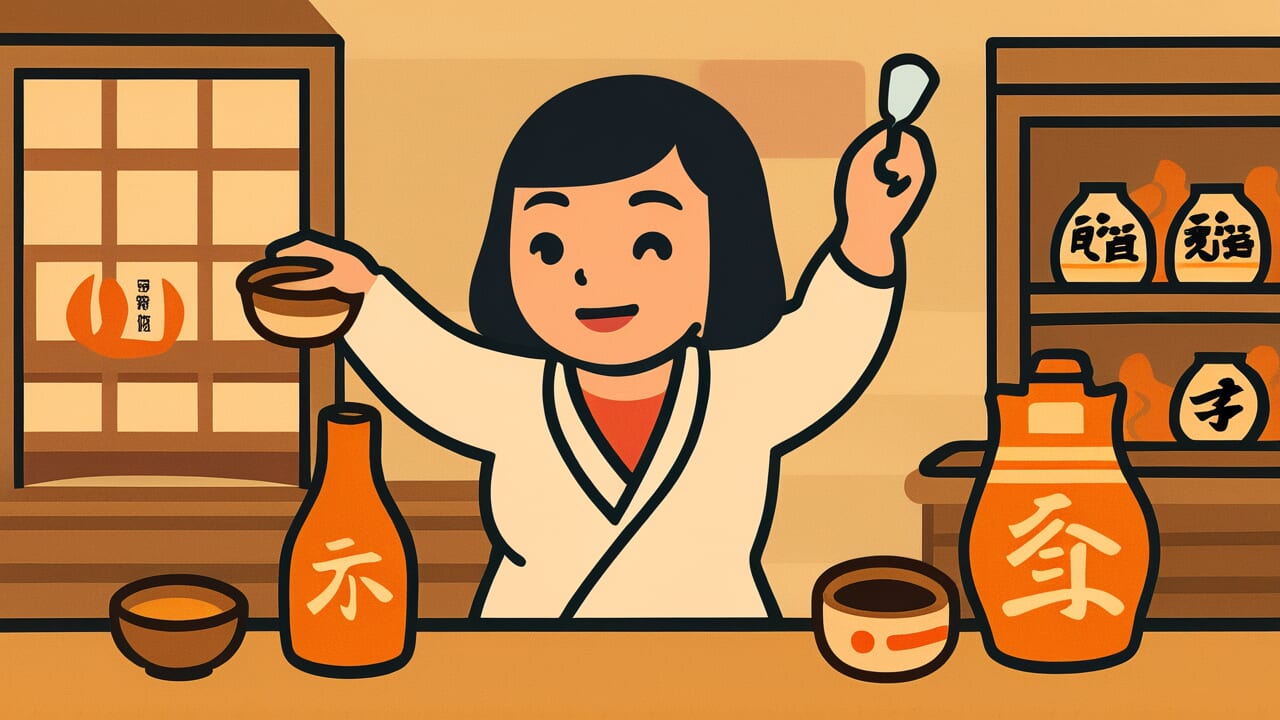How to Read “Buy sake and get your buttocks cut”
Sake katte shiri kirareru
Meaning of “Buy sake and get your buttocks cut”
“Buy sake and get your buttocks cut” means that buying and drinking sake leads to even greater losses.
This expression warns that drinking causes wasteful spending and should be avoided.
This proverb applies when drinking leads to unexpected expenses or damage.
It refers to various losses related to alcohol. These include not just the cost of sake itself, but wasteful spending while drunk, mistakes from poor judgment, and work problems from hangovers.
The proverb expresses an ironic situation. The sake you bought for enjoyment ends up causing harm to yourself.
Even today, many situations fit this proverb. Unexpected bills at drinking parties, regret over drunken remarks, and drinking that damages your health are all examples.
This wisdom still lives on as a warning. A moment of pleasure can lead to a heavy price later.
Origin and Etymology
No clear written records explain the origin of this proverb.
However, it likely came from the everyday experiences of common people during the Edo period.
Let’s look at the expression “get your buttocks cut.” This doesn’t simply mean “suffer a loss.”
It’s a much more intense expression. Having your buttocks cut means suffering damage so severe it’s like having part of your body injured.
During the Edo period, sake was a precious pleasure for common people. But it also put pressure on household budgets.
Sake wasn’t cheap back then. And once you start drinking, human nature makes it hard to stop at just one cup.
People who went out intending to buy sake often spent more than planned. Worse, they sometimes got caught up in unnecessary trouble while drunk.
The intense expression “get your buttocks cut” carries a warning. Losses from alcohol aren’t just financial.
They can extend to serious harm. You might lose trust, damage relationships, or even get caught up in violence.
This vivid expression conveys the irony. The seemingly pleasant act of buying sake results in painful consequences.
Usage Examples
- I wasted money at another drinking party—truly “buy sake and get your buttocks cut”
- He damaged his health from drinking every night and ended up hospitalized, so this is exactly “buy sake and get your buttocks cut”
Universal Wisdom
The proverb “Buy sake and get your buttocks cut” captures the eternal battle between human desire and reason.
Why do people reach for immediate pleasure even when they know they’ll suffer losses later?
This proverb teaches us about the fragility of human judgment. We cross the line while making excuses to ourselves.
“Just this once,” we say. “A little bit won’t hurt,” we tell ourselves.
When buying sake, nobody intends to “get their buttocks cut.” Instead, they imagine a fun time and picture themselves freed from stress.
But that enjoyment removes the brakes of reason. Before you know it, you’ve created an irreversible situation.
This proverb has been passed down for hundreds of years for a reason. Humans are creatures who fundamentally prioritize “now.”
Immediate pleasure looks more attractive than future loss. This human weakness applies to all temptations, not just alcohol.
Our ancestors understood this human nature. That’s why they issued a warning with the intense expression “get your buttocks cut.”
The price of pleasure is greater than you imagine. This wisdom never fades, no matter how times change.
When AI Hears This
Looking at this situation as a chain of losses reveals interesting insights.
The human brain strongly feels it must “recover” money already spent. This is called the sunk cost fallacy.
The person who bought sake thinks, “I bought it, so I want to get home quickly and drink it.” This psychology makes them rush home even on dangerous night roads.
What’s important here is the asymmetry in how humans evaluate losses. According to prospect theory, people feel the pain of losing money about 2.5 times more strongly than the joy of gaining the same amount.
This means the pain of wasting 100 yen on sake feels 2.5 times larger than the joy of gaining 100 yen.
To escape this pain, people take irrational actions.
Even more interesting is the failure in probability calculation. People try to avoid a small loss like the sake cost, but this increases the chance of a much larger loss from robbery.
For example, even if the sake costs 200 yen and the expected loss from robbery is 1,000 yen, the human brain focuses only on the certain small loss in front of them.
They underestimate the low-probability large loss. This cognitive distortion ultimately leads to the worst outcome of “getting your buttocks cut.”
People in the Edo period didn’t know behavioral economics. Yet they understood this trap of human psychology through experience.
Lessons for Today
This proverb teaches modern people an important truth. Small choices accumulate to determine your life.
Just as the simple act of buying sake can lead to unexpected results, your daily small decisions shape your future self.
Modern society is full of things besides alcohol that make you “buy and get your buttocks cut.”
Impulse purchases, game microtransactions, staying up late, and getting absorbed in social media all provide temporary satisfaction. But long-term, they steal precious things like time, money, and health.
What matters is developing the habit of pausing when facing temptation.
Ask yourself questions. “Will I really benefit from buying this?” “What’s the price of this pleasure?”
You don’t need to deny all enjoyment. Just take a moment to consider how that choice will affect your future self.
The wisdom of our ancestors isn’t meant to restrict you. It’s meant to protect you.
When you feel yourself being swept away by temptation, remember this proverb. True satisfaction comes from choices you won’t regret.



Comments